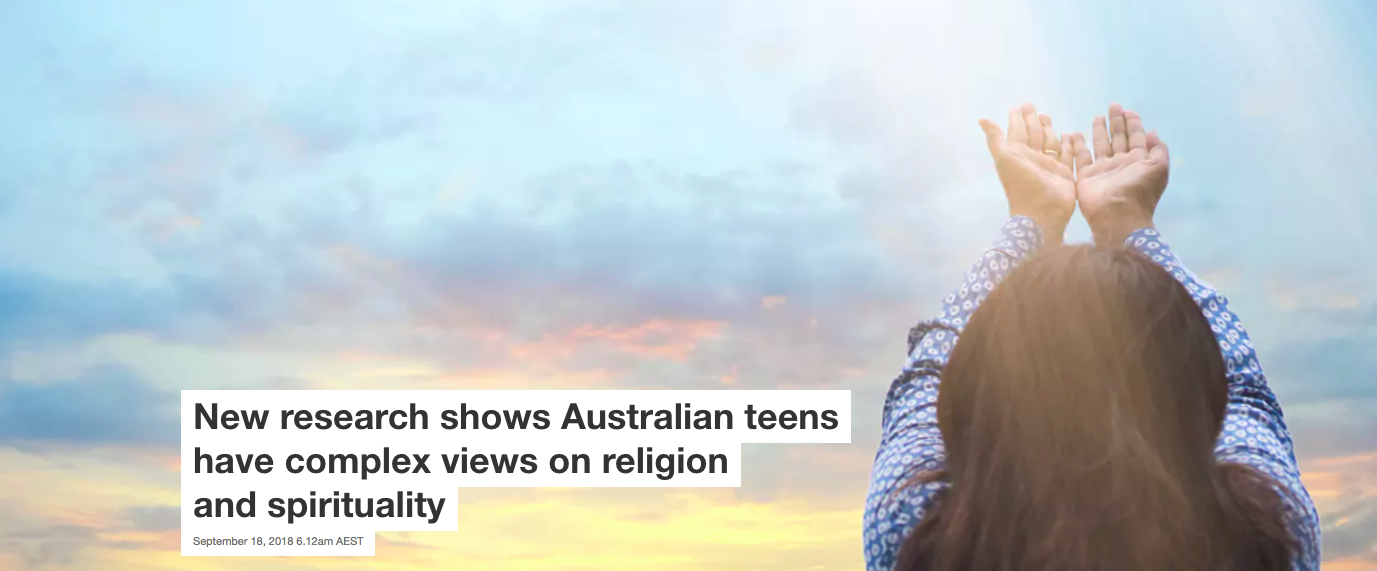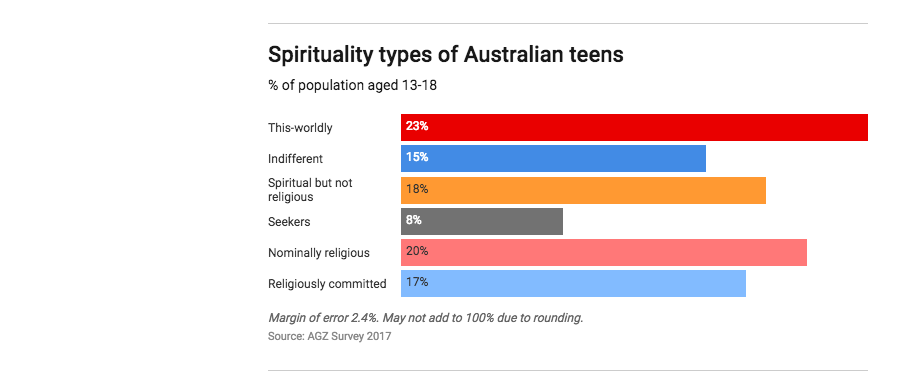September 18, 2018
Gen Z and Religion: “It’s All Good”
Just when you seem to have sorted it out, that pesky secular frame seems to dip and trough all over the place.

According to a report in The Conversation online news journal, Gen Z – today’s teen – has a less hostile, more ambivalent approach to religion than perhaps the Dawkins apostles would have wished and predicted by now, after all that money, effort, and nostril-flaring.
Turns out Gen Z is not wary of religion at all. Today’s teens are wary of those who are too forceful in their opinions. Don’t go shoving religion down our throats, but don’t lambast it either, it’s all good.
The hostility Tricky Dicky and his Boomer ilk raised about the evils of God in our culture hasn’t translated to all that much traction among the younger crowd.
Gen Z aren’t buying the horror stories. They’re not buying organised religion in huge numbers either, but there’s more shoulder-shrug than bird-flip towards religion among the current crop.
So while half of them identity as “nones” it’s not that simple, as The Conversation notes:
Digging deeper, we found a more complicated picture of faith and spirituality among young Australians. Most Gen Z teens have little to do with organised religion in their personal lives, while a significant proportion are interested in different ways of being spiritual.
Migration, diversity, secularisation and a burgeoning spiritual marketplace challenge the notion that we are a “Christian” country. More than any other group, teenagers are at the forefront of this remaking of Australian religion. Their daily experience of secondary school and social media sees them bumping into all kinds of difference. Teens are forming their own strong views about existential matters.
The spiritual search is not taking our teens to church, but there’s certainly an openness to the transcendent. Then again when we realise that the default of the human heart is worship, why are we surprised? Gen Z has certainly lost its faith in the market, the government or the larger institutions. They’re suspicious of anything that’s being “sold” to them, and that’s not only about church, it’s about everything.
Here’s a helpful breakdown of the percentages:

I’d have to say that 17 per cent religiously committed is quite impressive for that cohort. That includes all faiths, but there’s a binding sense of the presence of God and an afterlife among that total. The biggest percentage of Christians was Pentecostal and evangelical – no surprises there. By the time these Gen-Zs are having their own kids, I suspect the mainlines will be all but dead.
I suspect we’re going to have a smaller, but more committed core in our churches in coming decades. And if the word “smaller” leaps off the page at you, instead of the term “more committed”, then there’s a chance you’re missing the point.
The most intriguing group, and I would say the one that will most likely engage with Christianity as they grow into university years, is the Seekers:
Intriguingly different from both these “committed” groups are the exploratory Seekers, a small but vital 8% of teens. Their worldview is decidedly eclectic. They almost all self-describe as “spiritual”. This finds expression in belief in life after death, and repeated experiences of a presence or power that is different from their everyday selves.
Seekers have a decidedly eclectic worldview, seeking out their spiritual truth. They most likely consult their horoscopes, have seen a psychic, or both. At the same time, they identify with a religion and believe in God or a higher being.
Eight percent. Small but vital. Not a huge amount, but critical, and more importantly, critically thinking about life and what it means.
Despite the secular tsunami, despite the best efforts of the celebrity atheists, despite the glitz and glamour of the most marketed generation ever, they’re stubbornly clinging on to the fact that there is something transcendent. And they’re curious. Or as we might put it, despite Babylon, eight percent are Athenians at some level.
The biggest reveal by The Conversation among all of this is not the figures or percentages however, it is this:
…dig a bit deeper and there is a lot of diversity among our teens on matters of faith and spirituality. And that sits comfortably with them. Our data show they are genuinely open to diversity in other people. While only a minority follow a faith with strong conviction, as a whole they are not anti-religious. As we heard often: “It’s all good.”
Tellingly, teens are wary of attempts by some to dictate to others what they can and cannot do, or who are disrespectful of those not like themselves. Didactic politicians beware.
It’s all good
If we’ve heard a teen make that statement once we’ve heard them say it a million times.
Today’s teens are uncomfortable with zealotry. Zealotry of all stripes. They’ just as likely to thumb their nose at Richard Dawkins as they are at Franklin Graham.
And that means they’re probably more open to a wide-ranging conversation that asks genuine questions of them and listens to their stories, without going for “the kill” immediately.
After all, they’ve been raised by parents who have “bulldozed” all obstacles out of their way to ensure a smooth path for their lives. In general they’re unused to the cut and thrust of intellectual rigour. “It’s all good” is another way of saying “Back off and give me some space.”
Written by
There is no guarantee that Jesus will return in our desired timeframe. Yet we have no reason to be anxious, because even if the timeframe is not guaranteed, the outcome is! We don’t have to waste energy being anxious; we can put it to better use.
Stephen McAlpine – futureproof
Stay in the know
Receive content updates, new blog articles and upcoming events all to your inbox.


